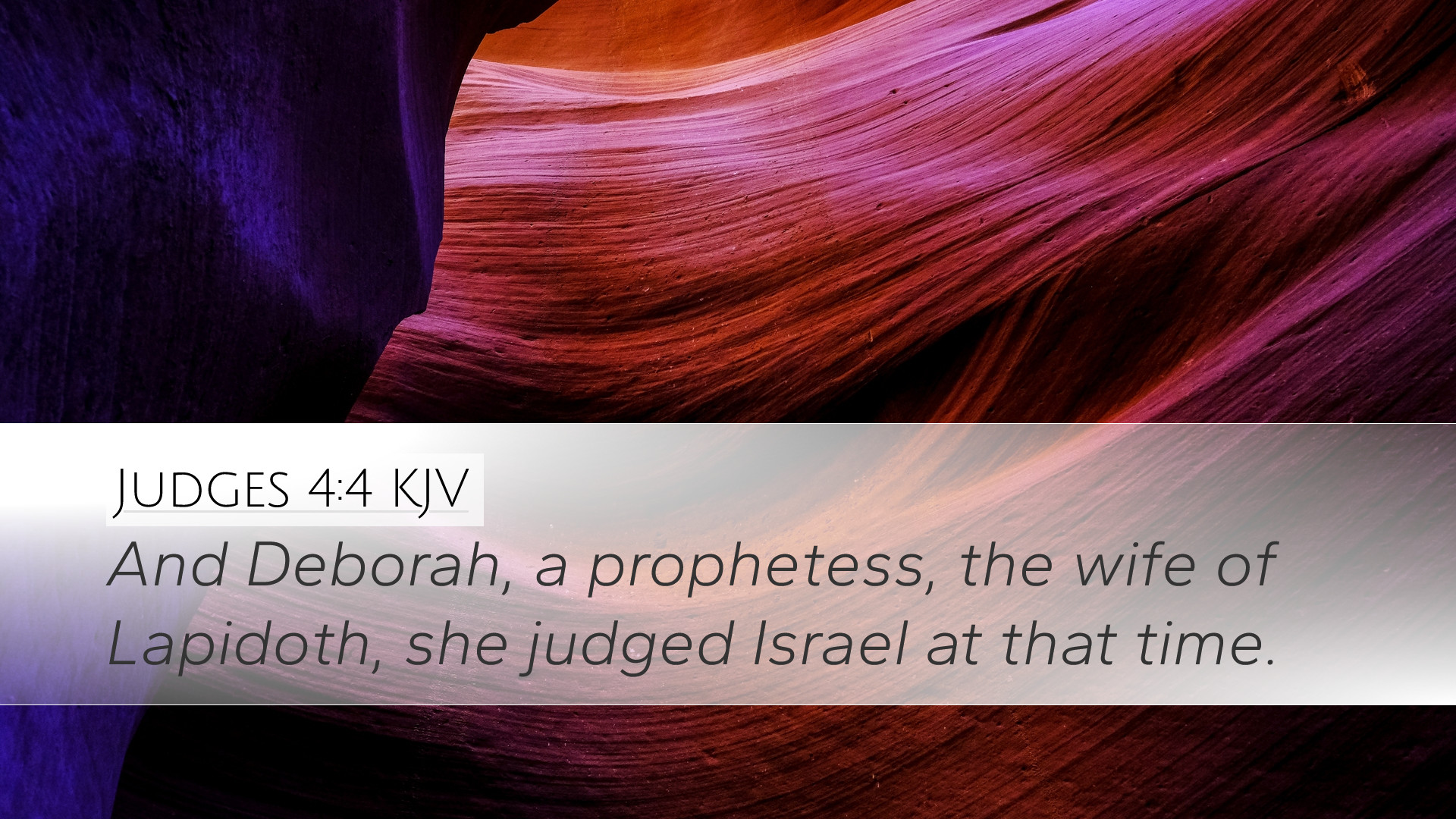Old Testament
Genesis Exodus Leviticus Numbers Deuteronomy Joshua Judges Ruth 1 Samuel 2 Samuel 1 Kings 2 Kings 1 Chronicles 2 Chronicles Ezra Nehemiah Esther Job Psalms Proverbs Ecclesiastes Song of Solomon Isaiah Jeremiah Lamentations Ezekiel Daniel Hosea Joel Amos Obadiah Jonah Micah Nahum Habakkuk Zephaniah Haggai Zechariah MalachiJudges 4:4
Judges 4:4 KJV
And Deborah, a prophetess, the wife of Lapidoth, she judged Israel at that time.
Judges 4:4 Bible Commentary
Commentary on Judges 4:4
Judges 4:4 states: "Now Deborah, a prophetess, the wife of Lapidoth, she judged Israel at that time." This verse introduces a pivotal figure in the narrative of Israel's history, Deborah, whose role as both a prophetess and a judge enriches our understanding of leadership and divine guidance in a turbulent period.
Historical Context
This verse situates itself within the cyclical narrative of the Book of Judges, wherein Israel experiences cycles of sin, oppression, repentance, and deliverance. Deborah's emergence as a leader highlights the unique circumstances of the time, which required divine intervention through unexpected means.
Analysis of Key Elements
-
Deborah's Role:
Deborah is described as a prophetess, indicating her role as a mediator of God’s word. According to Matthew Henry's Commentary, a prophetess is one who speaks in the name of God, and Deborah was a channel for divine revelations and guidance to the Israelites.
-
Judgment:
As a judge, Deborah governed and guided Israel. Albert Barnes notes that her position was rare for the time, and it underscores the fact that God can raise leaders regardless of societal norms pertaining to gender. This speaks directly to the inclusivity of God’s call and purpose.
-
Family References:
Deborah is identified as the "wife of Lapidoth," which signifies the importance of familial connections in ancient Israel. Adam Clarke suggests that this association may emphasize her grounded nature and role within the family unit, further indicating that her authority came from divine appointment rather than familial lineage alone.
Theological Implications
Deborah's leadership provides profound insights into God's sovereignty and the means by which He accomplishes His purposes. The selection of a woman in a predominantly patriarchal society illustrates the radical nature of God’s grace and calling.
-
God's Sovereignty:
Deborah’s judgment came at a time of despair for Israel. God, in His sovereignty, chose to work through her, demonstrating that Divine authority is not confined to human expectations or traditional roles.
-
Empowerment of Women:
This verse challenges contemporary perceptions about female leadership in spiritual matters. The acknowledgment of Deborah as both prophetess and judge can inspire modern readers, emphasizing that spiritual gifting transcends gender boundaries.
-
Divine Leadership:
The narrative invites reflection on the nature of God’s guidance. Deborah's prophetic role signifies that God’s word remains accessible, and His will can be discerned through those willing to listen and lead accordingly.
Lessons for Today
For pastors, students, theologians, and scholars, Judges 4:4 invites contemplation on several key lessons:
-
Understanding God’s Call:
This verse encourages individuals to seek and embrace God’s calling, irrespective of societal norms. Authentic leadership is often birthed in obedience to God’s directive.
-
Godly Leadership:
The characteristics of Deborah—wisdom, bravery, and spiritual insight—serve as a model for contemporary leaders. The emphasis on her prophetic role encourages leaders to submit to divine guidance in their decision-making processes.
-
Inclusivity in Ministry:
Deborah's story prompts a reassessment of inclusivity within church leadership today, urging congregations to recognize and cultivate diverse gifts among all individuals, irrespective of gender.
Conclusion
The verse Judges 4:4 is not merely an introduction to a female judge; it encapsulates God's profound ability to raise leaders from unexpected places and to empower them to fulfill His purposes. Through Deborah, we learn about the attributes of divine guidance, the importance of answering the call, and the potential that lies within diversity. Scholars and leaders alike can draw strength and insight from her example as they navigate their journeys of faith and leadership.


